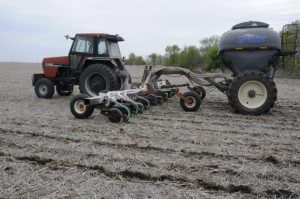Field day will explore benefits of cover crops and no-till – Sept. 6, near Marble Rock
For Release: August 23, 2018
Contacts:
Dennis Carney | dacarney27@gmail.com | (641) 330-6545
Tamsyn Jones | Outreach & Publications Coordinator | Practical Farmers of Iowa | (515) 232-5661 | tamsyn@practicalfarmers.org
MARBLE ROCK, Iowa — Whether it’s machinery, soil fertility or weed control, no-till farming can be a challenge for newcomers. But the technique also has the potential to offer many benefits, from improved soil health to less time and money spent on labor and fuel. Dennis Carney has become an expert in reaping the benefits of no-till practices.
The Carney farm was an early adopter of no-till 35 years ago. The fifth-generation family grain farm has always been non-GMO, and for the past four years has used aerially applied cover crops on 100 percent of its acres. Dennis also has 450 acres of land enrolled in the Conservation Reserve Program using a variety of practices, including those that foster habitat for upland game, pollinators and forests.
Dennis will share his experience with no-till and cover crops at a Practical Farmers of Iowa field day he is hosting on Thursday, Sept. 6, from 10 a.m. to 1 p.m., on his farm near Marble Rock (2790 Jersey Ave., about 2 miles southeast of town).
The event – “Cover Crops and On-Farm Conservation” – is free to attend and will include lunch. RSVPs are appreciated for the meal to Debra Boekholder, debra@practicalfarmers.org or (515) 232-5661, by Monday, Sept. 3. This field day is sponsored by Albert Lea Seed, Iowa Agriculture Water Alliance and Iowa Farmers Union.
Attendees will learn how modifying machinery to accommodate deep-banding of fertilizer after planting can be successful when using cover crops. Dennis will discuss the issues he has encountered over his years of no-till farming, and how he has addressed those challenges.
“There will be a discussion on the good, the bad and the ugly experiences of a 35-year no-tiller, including machinery and fertilizer management and placement,” Dennis says.
During the day, Erin Hodgson, extension entomologist with Iowa State University, will talk about ISU research on aphid-resistant cultivars of soybeans, and how this can be an effective pest management practice.
Dennis will also discuss his long-term CRP practices and how to develop a conservation lease. The farm is nearing the end of family operation, Dennis says, and he “hopes to empower future operators to continue the farm’s ethic of conservation.”
Directions from Marble Rock: Take 270th Street / County Road B60 east for 1 mile to Jersey Avenue / Co Rd T34 and turn right (south). In 1 mile, look for the farm on the left (east) side of the road.
Directions from Greene: Take IA Hwy 14 north for 3.5 miles to 280th Street, turn left (west) and travel 2 miles. Turn right (north) on Jersey Avenue / Co Rd T34; the farm is on the right (east) side of the road.
Practical Farmers’ 2018 field days are supported by several sustaining and major sponsors, including: Albert Lea Seed; Applegate Natural & Organic Meats; Blue River Organic Seed; Cascadian Farms; Center for Rural Affairs; Farm Credit Services of America; Gandy Cover Crop Seeders; Grain Millers, Inc.; Green Cover Seed; Green Thumb Commodities; Iowa Agriculture Water Alliance; Iowa Beef Center; Iowa State University Department of Agronomy; Iowa Sustainable Agriculture Research and Education (SARE); ISU Extension and Outreach; La Crosse Forage and Turf Seed; MOSA Organic Certification; Natural Resources Defense Council; Organic Valley / Organic Prairie;PepsiCo; Pipeline Foods; Premier 1 Supplies; Sunrise Foods International; The DeLong Company; The Fertrell Company; The Scoular Company; Unilever; University of Iowa College of Public Health (I-CASH); USDA: Natural Resources Conservation Service; Wallace Chair for Sustainable Agriculture; and Welter Seed & Honey Co.
###
Practical Farmers of Iowa works to equip farmers to build resilient farms and communities. Our values include: welcoming everyone; farmers leading the exchange of experience and knowledge; curiosity, creativity, collaboration and community; resilient farms now and for future generations; and stewardship of land and resources. To learn more, visit http://practicalfarmers.org.

